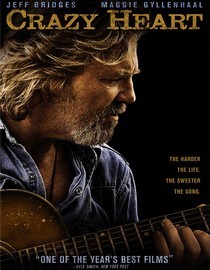2.06.2010
REVIEW: Crazy Heart (Scott Cooper, 2009)
The shambles of his career hitting new lows, 57-year-old country music has-been Otis "Bad" Blake (Jeff Bridges) is adrift on the road between dive bars and bowling alleys, strumming and crooning his hits from days past to smaller and smaller audiences. Between fleeting glimmers of forgotten passion he circles the drain as reckless alcoholism and a cynically withdrawn attitude slowly begin to get the better of him... that is, until feelings thought lost unexpectedly reenter his life and bring about fresh motivation. Maggie Gyllenhaal, Colin Farrell and Robert Duvall (who takes an executive producer's chair) co-star in this captivating and surprisingly light, fictional biography based on Thomas Cobb's novel of the same, only somewhat fitting title.
Following a landscape of New Mexico that will push the buttons of any road-tripper, we are introduced to the weary "Bad" Blake. He is a fading male archetype - a refresher course in what it truly means to be a late-20th century cowboy. He is Bob Seger had Seger gone country in the 70's and traded his iconic Harley for a rusty Ford... and immediately we identify with him. Through reserved camerawork and Bridges' way of slipping into this character the way he might a pair of old, torn blue jeans, all the back-story one needs unfolds in a matter of seconds. Such is "Crazy Heart" - a tale woven not by tired, spoon-fed exposition but by constant character development. The way a Jarmusch film may inform its audience with well-placed props or thematic set design, the information here is primarily conveyed through scant yet subtly revealing dialogue accompanied, perhaps, by a slight gesture of the eyes or a particular positioning of the jaw. The essence of the film is in these details.
While at this somewhat stagnant point in the history of cinema, it's all been done and it's all been done again (and in most cases, again and again), "Crazy Heart" employs mostly fresh means by which to present itself. As previously alluded to, Bridges follows suit and more, taking his performance to true method territory. He has defined his unique talents in memorable films such as "The Big Lebowski" and "The Door in the Floor" and here he defines himself again. There may be the ever-presence of his bemused demeanor or a certain sense of timing between his lines but here Bridges is nothing but Blake. His potency makes us smell smoke seeped in the fabric of his shirt from the previous night's bar... taste McClure's whiskey on his gravely voice... and endure his unforgiving highway. We cheer for him yet sympathize, wanting better for the broken hero in spite of his often poor decisions.
The supporting on-screen talent impresses, but this being Bridges' show, the most intriguing aspect of any conversation scene is how the multi-dimensional second and third-billed actors play off of the force that is "Bad" Blake. Gyllenhaal, who has gone on record many times professing her pride for the film, pulls off her pivotal role with apparent finesse. The relationship she develops with Blake feels different and new. Farrell, a personal favorite of this reviewer, puts forth one of his best performances to date and proves yet again he is the whole package. Then there is Duvall, whose arrival is as that of a welcome, old friend.
Beyond the clear centerpiece that is arguably one of Bridges' very best outings, "Crazy Heart" is notable for gracefully calling out - as Gyllenhaal's character puts it - 'artificial' country music. In an age where simply mentioning your tractor-trailer can get you a platinum record in Nashville, a running commentary throughout this film honors the greats like Buck Owens and Townes Van Zandt (both featured on the soundtrack) while condemning the hacks that monopolize contemporary radio frequencies. It is a bold position that couldn't have been handled better in this case.
Now, the fact aside that Cobb's novel was published in 1987, one viewing "Crazy Heart" cannot help but conjure recent memories of another fictional, washed-up star biopic. The reference, of course, is to Darren Aronofsky's incredible 2008 film, "The Wrestler". In many ways, the two films are mirrors of one another. Completely different techniques are utilized to move the story, but the overarching themes and even some of the plot points are identical... until the final act. Where Randy the Ram chooses to remain true to himself for better or worse, a far different path is selected for "Bad" Blake. This is sure to split audiences down the middle, but while comparing the two similar films makes their diversion from one another interesting to dissect, looking at the third act of "Crazy Heart" as its own piece is to study a cinematic slap in the face. Sure, the first 70 or so minutes don't carry the crop's cream in terms of focus, but during them we are in Blake's passenger seat, happily along for the ride. Come act three the appropriately creaky, wooden coaster hits a big bump, never to fully recover, belying the film that until that point had been entirely acceptable. Thankfully, the first two acts build enough merit to make this rocky finish mostly forgivable.
Properly inspired with effort in all the right places, "Crazy Heart" proves worthy of adulation. It takes its time without overindulging and without losing aim it allows for hearty laughs amidst what could otherwise be overwrought and depressing. Glimpses of potentially classic film dialogue are offered by the quartet of actors with Bridges as the more-than-obvious stand-out and Farrell polishing a tidy runner-up slot. It is sure to entertain - perhaps warm a heart or three - even if the payoff doesn't quite live up to the arrangement. If anything, it is refreshing to see a low key film that refuses to abuse the all too trendy 'shaky cam' technique. Bring a friend... and a fifth of McClure's.


